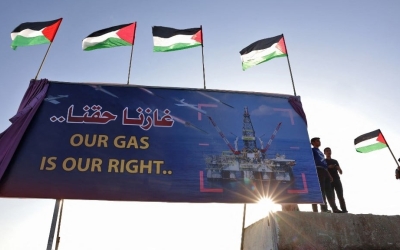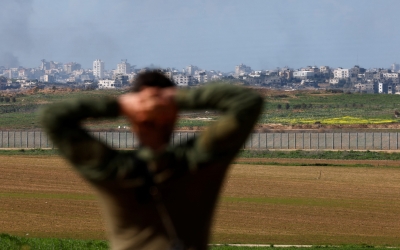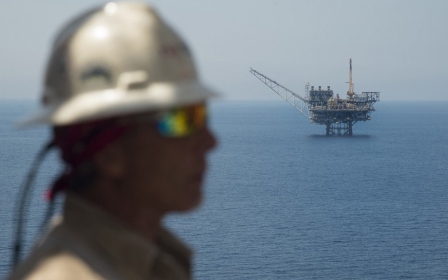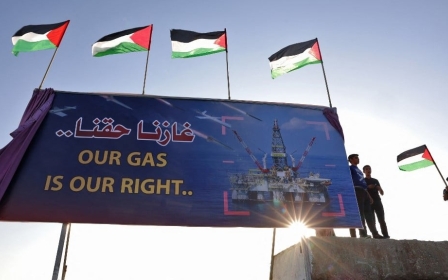The war on Gaza is also an Israeli drive to seize Palestinian gas reserves
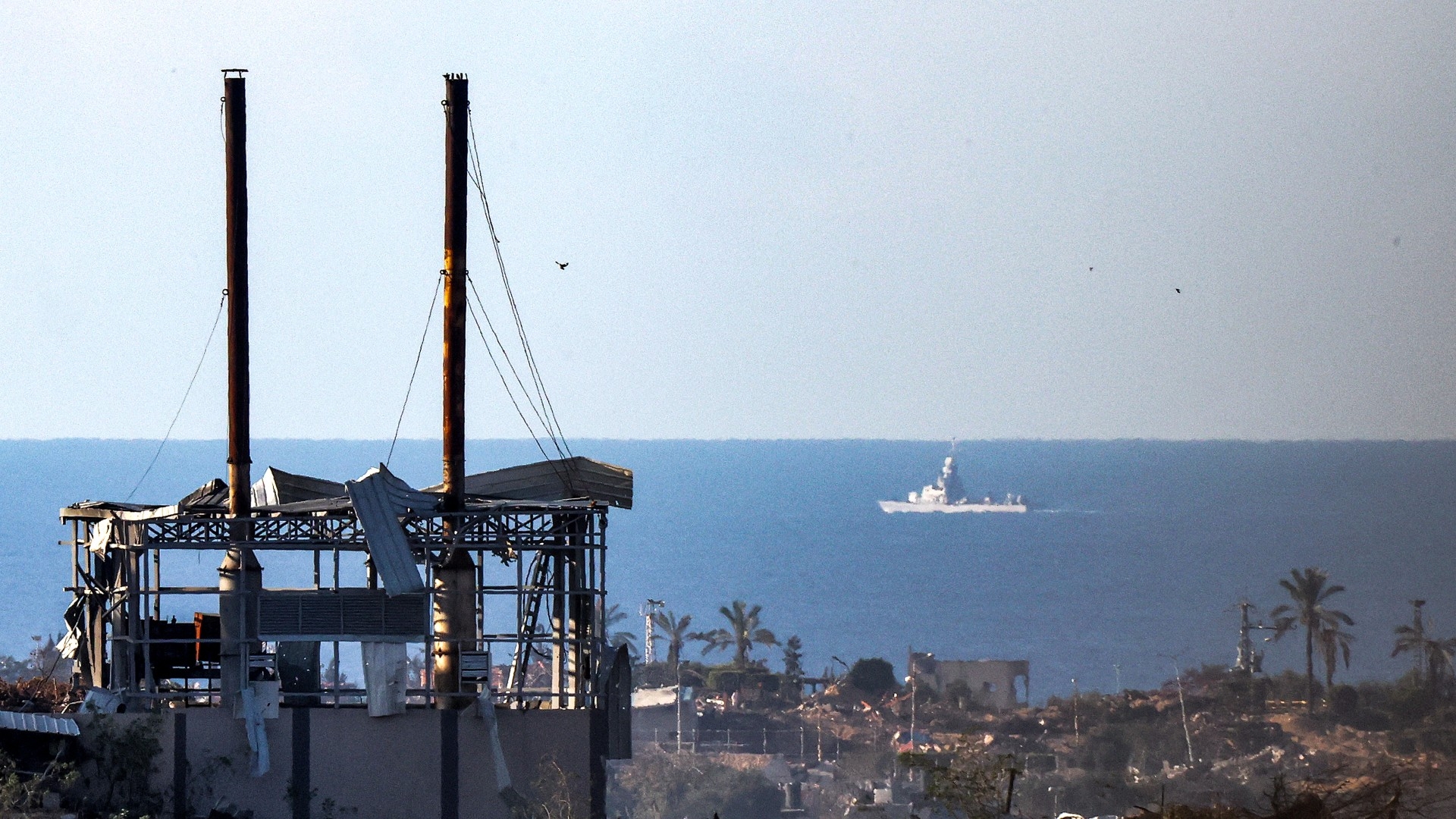
The terrifying scale of the destruction Israel’s war machine has wrought in Gaza indicates that the goal of this onslaught is not merely to destroy Hamas.
Rather, we can infer that this aggression has been a long time coming, as Israel waited for an opportune time to unleash its full military force against the besieged Palestinian territory.
Some have argued that Israel’s goal is to push the population of Gaza into the Sinai, and the 7 October Hamas attack provided a pretext for this operation to begin in earnest. Zionism as an ideology is based on the displacement of landowners through intimidation and cutting off vital infrastructure, paving the way for Israeli settlers to move in.
But there is another, more important reason behind Israel’s current war: the promising natural gas wealth found in the Eastern Mediterranean, specifically off the coast of Gaza.
The Levant gas field includes the shores of historic Palestine (Israel and Gaza), Syria, Lebanon and, on the opposite side, the island of Cyprus. This field is estimated to contain about 122 trillion cubic feet of natural gas.
New MEE newsletter: Jerusalem Dispatch
Sign up to get the latest insights and analysis on Israel-Palestine, alongside Turkey Unpacked and other MEE newsletters
As for the Palestinian shores of Gaza, British Gas confirmed in 1999 that the reserves in Gaza Marine are estimated at 1.1 trillion cubic feet of natural gas. That same year, the Palestinian Authority granted British Gas a 25-year contract to exploit the Gaza Marine natural gas field. Until now, after 25 years, the Palestinians have never benefited from it.
Follow Middle East Eye's live coverage of the Israel-Palestine war
This is due to the obstacles that Israel placed under many pretexts, including for example the fear that the revenues will go to "finance terrorism" against Israel.
Several Israeli governments from Ehud Barak to Benjamin Netanyahu have given approval to the Palestinians on several occasions to begin exploiting the Gaza Marine. However, every time Israel retracted its approval.
It is obvious Israel is keen not to give the Palestinians any sense of sovereignty over their land or territorial waters, which is further evidence of Israel's premeditated intentions to displace the Palestinians from their historical lands and confiscate their natural resources.
In addition to Gaza's natural gas, it is worth pointing out that Israel is stealing Palestinian natural gas from the Meged oil and gas field in the occupied West Bank under the pretext that the field is located to the west of the armistice line of 1948.
Expansionist policies
While Israel has never been serious about the so-called peace process or the Palestinian right to independence and self-determination, Netanyahu has taken an exceptionally hard line. The state’s longest-serving leader chose the path of “economic peace”, which entails slight improvements to the economic conditions of Palestinians living under occupation in order to quell resistance.
At the same time, he has focused on mega-projects tailored primarily to benefit Israelis, while potentially offering secondary benefits to the Arab population.
Israel views ... all Palestinian resistance groups as a bottleneck to its greater regional ambitions, most notably the seizure of Gaza's natural gas wealth
In this regard, he has focused on two main areas: transforming Israel into a gateway and corridor linking East and West, and making the state a global centre for natural gas exports.
On the first goal, the centrepiece is the planned India-Middle East-Europe Economic Corridor (Imec), which will connect India with Europe via the Gulf and Israel.
In addition, amid the ongoing risk of attacks in the Red Sea, Egypt and the UAE have worked with Israel to establish an alternative land route via Saudi Arabia and Jordan to bypass the Yemeni threat. As for the second goal, Israel has made significant efforts to conclude gas deals with Cyprus, Greece and Egypt.
But Israel’s plans and ambitions in this regard will not be complete unless it confiscates Gaza’s gas reserves. Netanyahu has made clear his intentions to bypass the aspirations of the Palestinian people, having noted last year that “they should be part of the [peace] process, but they should not have a veto over the process”.
Post-war scenarios
Israel’s desire to seize Gaza’s gas can partially explain Netanyahu’s intransigence when it comes to ceasefire initiatives, as this project hinges on Israel maintaining security control over the territory and expelling the Palestinian population. Israeli ministers have spoken openly about these goals since the start of the war.
Among the evidence that proves the validity of this analysis are two important matters. First, it is surprising that Israel has granted licences to three companies to explore for natural gas in the marine area off the shores of Israel and Gaza.
This Israeli move confirms what we stated previously about Israel’s deliberate intention to steal the Palestinians’ natural gas wealth, reasoning that Gaza (Palestine) is not a sovereign state and therefore has no right to demand sovereignty over the Special Economic Zone according to the Law of the Sea (Unclos), although Palestine has been accepted as an observer member of the UN in 2012.
Israel has not yet signed the UN Convention on the Sea, and has not even demarcated its maritime borders. It should be noted here that Lebanon has insisted on demarcating the maritime borders with Israel in order to guarantee that Lebanon’s natural gas is not being stolen by the occupying state.
The second matter is the document prepared by the Israeli Ministry of Intelligence less than a week after operation Al-Aqsa flood, which basically identified three options for the situation of the Palestinians in Gaza after the war.
Option A: The population remaining in Gaza under Palestinian Authority rule. Option B: The population remaining in Gaza along with the emergence of a local (non-Hamas) Arab authority. Option C: The evacuation of the civilian population from Gaza to Sinai.
The document points out that option C is the most favourable one for Israel and it is executable, according to the document, all that is needed is the determination in the face of the international pressure with an emphasis on harnessing the support of the US and other pro-Israel governments.
No unified leadership
Israel is aware of the enormous amount of political support it enjoys from the West in Europe and the United States.
These actors just participated in the latest Munich Security Conference whose main focus was on the normalisation between Israel and Arab states by expanding the Abraham Accords, the Imec Corridor, as well as the "threat" posed by Iran and its allies. In other words, the conference focused on Israel's concerns while there was no sincere discussion about 75 years of Palestinian suffering.
Because there has been no strong, unified Palestinian leadership since the Oslo Accords, Israel has for decades enjoyed the freedom to implement its expansionist, settler-colonial policies in the absence of significant Palestinian opposition. But the attack by Hamas on 7 October shattered this illusion.
Israel views Hamas and all Palestinian resistance groups as a bottleneck to its greater regional ambitions, most notably the seizure of Gaza’s natural gas wealth.
The shocking breakout by Hamas on 7 October underscored the difficulties that Israel faces in attempting to impose its agenda on the region. The armed group has thus far refused to hand over the remaining Israeli hostages, holding out for a deal that would end the war and facilitate the reconstruction of Gaza.
Ultimately, the goal of an independent Palestinian state - or at least one in which Palestinians can control their own natural resources - is attainable, but first they must withstand Israel’s onslaught in Rafah. This could be Israel’s last chance to displace the Palestinian population of Gaza.
The views expressed in this article belong to the author and do not necessarily reflect the editorial policy of Middle East Eye.
Middle East Eye delivers independent and unrivalled coverage and analysis of the Middle East, North Africa and beyond. To learn more about republishing this content and the associated fees, please fill out this form. More about MEE can be found here.



